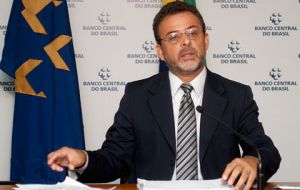MercoPress. South Atlantic News Agency
Brazil loan delinquencies down; Rousseff wants lower rates from private banks
 Maciel said credit growth is expected to be in the range of 15% this year
Maciel said credit growth is expected to be in the range of 15% this year Loan delinquencies at Brazilian banks fell in March for the first time this year, a sign that households are reining in debt to get current on their obligations, central bank data showed on Wednesday.
Loans in arrears for 90 days or more, the most widely followed gauge of bank defaults, fell to an amount equal to 5.7% of outstanding loans in March, compared with 5.8% the prior month. It was the first decline since a drop in December in the default ratio of 0.1 percentage point.
The numbers should provide a breather to investors, who are increasingly concerned over the rising trend of delinquencies in Brazil, Latin America's largest economy. Rising defaults led Itaú Unibanco and Banco Bradesco to set aside more money for bad loan provisions, sparking declines in their share prices.
Central bank officials stressed that a more pronounced decline in defaults will take place as economic growth recovers in the medium term, while industry executives expect delinquencies to keep rising throughout the year.
“The decline in the default ratio in March ... was in line with our outlook for an improvement in the indicator. However, this does not mean that there will be continuous reduction in delinquencies,” Tulio Maciel, the bank's head of economic research, told reporters in Brasilia.
The driver behind March's decline in defaults was a reduction in consumer loan delinquencies - the first since December 2010. Defaults on corporate loans remained stable for a second month.
The decline in defaults could fan government pressure on private sector banks to slash borrowing costs and step up disbursements to help revive an ailing economy. State-controlled banks Banco do Brasil, the nation's largest bank, and Caixa Economica Federal are taking the lead with those actions, forcing their rivals to follow suit.
President Dilma Rousseff has led an aggressive push to revive growth after Brazil nearly fell into recession late last year. The central bank has slashed its s benchmark interest rate to near record lows, while the government has lowered taxes on manufacturers and pumped out billions of dollars in subsidized loans to support activity.
Lending growth in Brazil gained momentum in March, led by rising demand for corporate and state loans. Outstanding loans in Brazil's banking system rose 1.7% in March from February to 2.07 trillion Reais (1.1 trillion dollars), up from a 0.4% expansion in the previous month.
The bank maintained its forecast for credit growth of 15% this year, following growth of 19% in 2011, Maciel said. After a dip in January, lending rebounded in February largely due to more disbursements from state-owned banks.
Development bank BNDES has stepped up disbursements to companies this year, charging them below-market interest rates with funding from the national treasury.
BNDES disbursed 24.5 billion Reais in loans during the first quarter of the year, the central bank said, mostly to infrastructure projects as Brazil races to build stadiums, roads and airports for the 2014 soccer World Cup and 2016 Olympics.




Top Comments
Disclaimer & comment rulesCommenting for this story is now closed.
If you have a Facebook account, become a fan and comment on our Facebook Page!